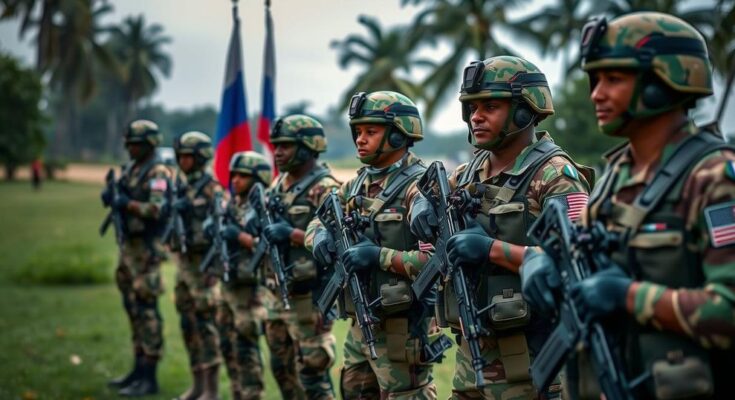Russia has sent 200 troops to Equatorial Guinea to protect President Teodoro Obiang. This deployment reflects a broader strategy to enhance Russian influence in Central and West Africa amid declining Western power. Russian forces are involved in training elite guards in the cities of Malabo and Bata, potentially including Belarusian troops. This military presence supports the Obiang regime and allows Russia to exploit economic opportunities in the region.
Russia has recently deployed up to 200 troops to Equatorial Guinea with the purpose of providing security for President Teodoro Obiang. Reports from various African media sources indicate that these Russian military personnel are engaged in training elite guards in the key cities of Malabo and Bata. There are also indications that some of these troops may consist of Belarusian forces, highlighting a potential alliance within Russian military operations. This deployment occurs amid a wider trend of increasing Russian influence and decreasing Western sway in Central and West Africa, characterized by Russia’s support of military regimes and combat against jihadist threats in the region. In a country ruled by the 82-year-old Obiang since a coup in 1979, the presence of Russian security forces serves to bolster the regime’s stability and safeguard against dissent. Following a visit to Moscow on September 26, President Obiang expressed gratitude towards Russian President Vladimir Putin for the military assistance provided to enhance Equatorial Guinea’s defenses. Reports regarding troop presence in Equatorial Guinea surfaced for the first time in August, solidifying Russia’s commitment to expanding its influence within Africa, reinforcing military juntas, and securing its economic interests in the resource-rich nation.
The involvement of Russian troops in Equatorial Guinea forms part of a broader strategy by Moscow to extend its geopolitical reach across Africa, particularly in the face of waning Western dominance. Using military aid and personnel, Russia aims to support authoritarian regimes like that of President Obiang while simultaneously capitalizing on economic opportunities within the sector of natural resources such as mining and energy. This reflects a global shift, where geopolitical contests are increasingly manifesting in the African continent, with Russia positioning itself as a crucial ally for regimes seeking protection against insurgents and opposition.
In sum, the dispatch of Russian troops to Equatorial Guinea underscores the evolving geopolitical landscape of Africa, wherein Russia is strategically enhancing its presence through military support and training. This move not only aims to secure the longevity of President Obiang’s regime but also signifies Russia’s broader ambitions in weakening Western influence while exploiting Africa’s rich resources. As these developments unfold, they invite closer scrutiny of international alliances and the implications for regional stability.
Original Source: www.agenzianova.com




